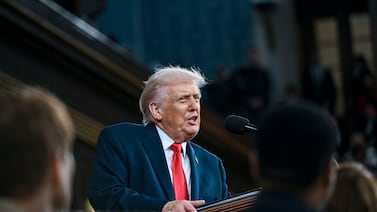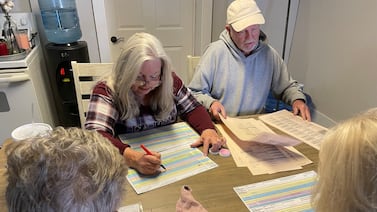Votebeat is a nonprofit news organization reporting on voting access and election administration across the U.S. Sign up for Votebeat Pennsylvania‘s free newsletter here.
Pennsylvania voters went to the polls last week to help carry on a centuries-old practice that no other state does: elections to choose their election workers.
“It was a great idea in the 1800s that they never got rid of,” said Thad Hall, Mercer County’s election director, who just oversaw a primary to select the Democratic and Republican candidates for more than 150 poll worker positions.
Counties are still finalizing the results from the May 20 election. The counting includes the slow process of tabulating write-in votes, as many races don’t have candidates listed on the ballot. In Mercer County, roughly 50% of the positions did not have a nominated candidate, Hall said, and he suspects “a lot” of his open positions won’t have a candidate on the ballot in November, either.
There are over 9,000 voting precincts in the state, and each has three positions that need to be elected: a judge of election, and a majority and minority inspector. That means every four years, the state needs to elect more than 27,000 workers. Rarely are there enough candidates to compete in all those races.
Hall said people have been known to write in their friends or family members as a joke, and those people end up winning — sometimes with just a single vote.
“You email people and they’re like ‘Are you serious? Are you kidding?’ And then they’ve got to decide if they want to do it,” he said. “People think you’re pulling their leg, because someone was pulling their leg in the first place.”
The end of the road in Rhode Island
Historians say Pennsylvania has been electing poll workers since 1799. And according to data from the U.S. Election Assistance Commission, it’s the only state in the country that directly elects the poll workers who run voting precincts. Most states choose them through appointment.
And in Pennsylvania, if no candidate is elected in November, or the elected candidate resigns, county election directors are permitted to appoint someone to the position.
Some New England states elect town officials who oversee voting locations as part of their job, but they don’t necessarily elect workers for every precinct, instead hiring or appointing additional people. Most states have adopted an appointment system.
The last state to do away with the practice of electing election workers was Rhode Island, in 2009.
Former Rhode Island state Rep. Michael Marcello, a Democrat, wrote the bill that ended those elections. He said at the time that the change would prevent these positions from being politicized. But co-sponsor Scott Pollard, also a Democrat, recalled that there was also a more practical reason:
“We were having tremendous difficulty actually getting people to put their name on a ballot to run.”
One deterrent, Pollard said, was that would-be poll workers in Rhode Island were required to file the financial forms that political candidates often have to submit to disclose any potential financial conflicts of interest.
“People are willing to do community service,” he said, “but you can’t make them jump through too many hoops to do it.”
In Pennsylvania, poll worker candidates don’t have to file statements of financial interest, but there are other hoops they have to jump through.
As in Rhode Island, poll workers here run as partisans in the primary. To get on the primary ballot, they have to file nomination petitions, signed by enough local voters. Candidates for election judge, who oversees the voting precinct, must obtain signatures from 10 qualified voters. Candidates for inspector, who signs in voters and checks their registrations among other tasks, must get five signatures to qualify.
Jay Schneider, a Chester County resident who served as an appointed judge in his precinct for the 2024 election, told Votebeat and Spotlight PA in March that these hurdles were part of the reason he chose not to run for the position this year.
But not getting on the primary ballot isn’t necessarily a barrier, given the lack of demand for the job.
‘Someone who’s breathing’: The struggle to find poll workers
Hall, from Mercer County, said the kind of all-appointment system that most states use would help for election directors. It would make it easier to move workers around if there are personality conflicts, and to remove problematic workers if needed. Additionally, it would save them the logistical burden of having hundreds of extra positions on their ballots.
Jeff Greenburg, a former election director who now works for the good-government group Committee of Seventy, said that switching to an all-appointment system may solve some of the administrative problems with electing poll workers, but he wants to see more solid evidence that the switch would fix the bigger issue of poll worker shortages.
Pennsylvania election officials, like many elsewhere, have struggled to keep their precincts fully staffed in recent years.
“As one person said, ‘We just want someone who’s breathing,’” said Devin Rhoads, Snyder County’s election director.
Rhoads argues that electing poll workers has benefits, too, such as imbuing the positions with an added sense of responsibility.
“If a person is elected it carries more weight,” Rhoads said, adding that those workers will have the mindset of “Well, l signed up for this.”
“If you’re appointed, maybe it kind of gives you a little bit of wiggle room, like ‘Well, I was just appointed, I can get out of it,’” he said.
The catch in this logic is that people actually have to be willing to run for the poll worker positions. And in many places, they aren’t.
Rhoads estimates that roughly two-thirds of Snyder County’s election worker positions won’t have candidates on the ballot in the fall municipal election, meaning some workers will need to be appointed.
In Allegheny County, home to Pittsburgh, officials say 3,500 of the roughly 4,000 elected poll worker positions on the November ballot will lack a candidate.
“People don’t want to run for these positions,” said Abigail Gardner, a county spokesperson.
What can be done to attract workers?
Formally switching from an elected to appointed poll worker system would require state legislation. Short of that, there are other things the state could do to help recruit poll workers.
First, Greenburg said, counties should increase pay. The state’s Election Code currently sets minimum pay at $75 for the day. But a poll worker’s day is usually at least 13 hours, which works out to an hourly rate that’s less than minimum wage.
A bill that recently passed the state House would increase that minimum to $175, but many counties are already moving beyond that. Philadelphia offered $295 for workers in the May 20 primary.
Greenberg also thinks the process for getting on the ballot should be simplified.
Instead of collecting signatures on a nominating petition, he said, it could be enough for a candidate to sign an affidavit affirming that they are qualified to run for the office.
Carter Walker is a reporter for Votebeat in partnership with Spotlight PA. Contact Carter at cwalker@votebeat.org.




